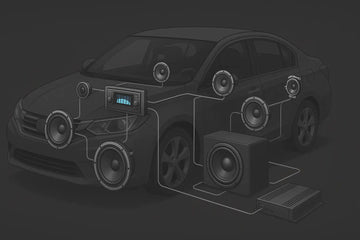When standard audio equipment doesn’t match your specific vision or requirements, custom audio solutions bridge the gap between generic products and your unique needs. Unlike mass-produced systems designed for broad appeal, custom audio represents a tailored approach that considers your exact specifications, environment, and goals.
The custom audio industry has evolved significantly, moving beyond simple modifications to encompass sophisticated technologies like object-based audio, personalized spatial rendering, and adaptive sound systems. Whether you’re restoring a classic vehicle, building a professional studio, or seeking the perfect sound for your business, understanding custom audio options can transform your listening experience.
This comprehensive guide will explore the diverse categories of custom audio services available today, helping you learn what’s possible and find the right solution for your specific situation.
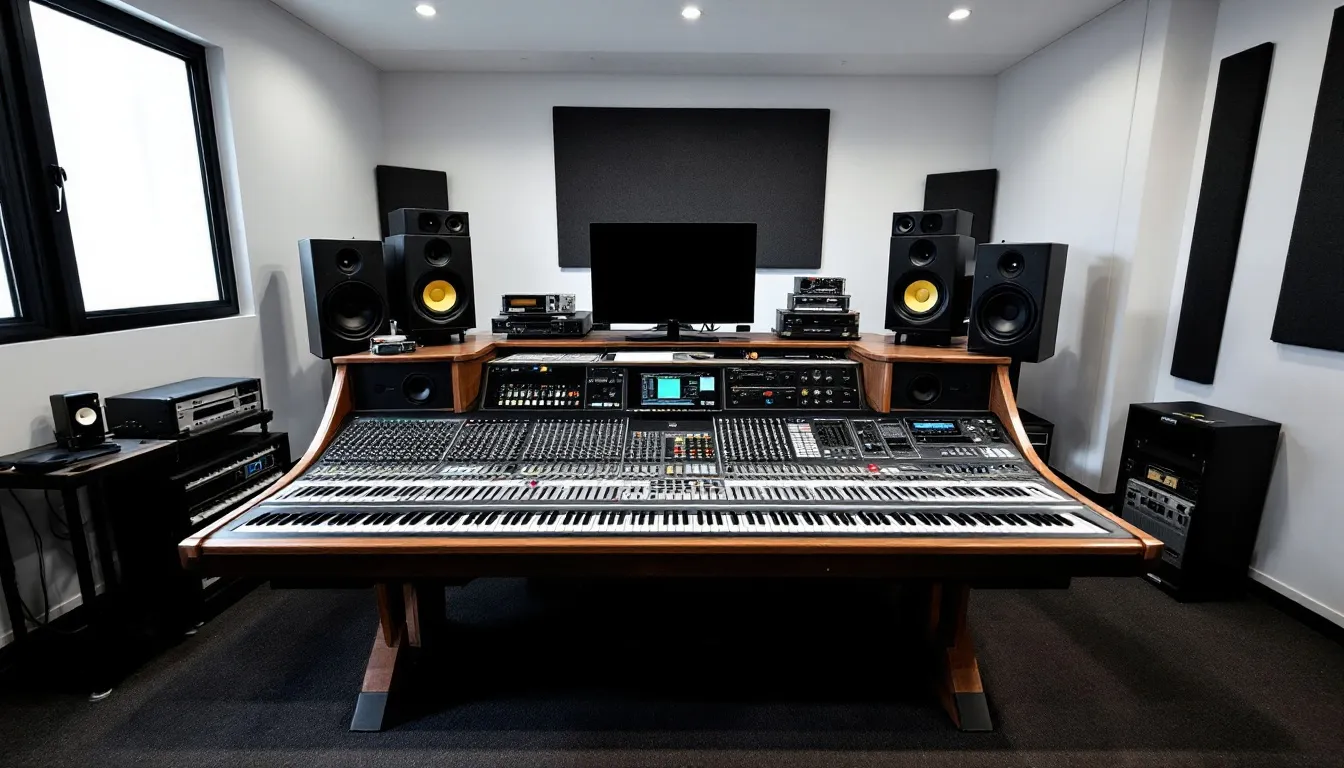
What is Custom Audio
Custom audio refers to sound solutions specifically designed, modified, or built to meet individual requirements rather than relying on standard, off-the-shelf products. This approach prioritizes precision over convenience, resulting in audio systems that perfectly match the user’s intended application, aesthetic preferences, and performance expectations.
Definition and Core Principles
At its foundation, custom audio involves deliberate personalization of every aspect of a sound system. This can range from selecting specific components that complement each other, to hand-building cables with precise specifications, to creating entirely bespoke audio content for branding purposes. The key distinction lies in the intentional customization process that considers factors often overlooked by mass-market solutions.
Benefits Over Standard Solutions
Custom audio solutions offer several advantages that justify their typically higher investment:
Perfect Integration: Custom systems are designed to work seamlessly within specific environments, whether that’s a 1960s muscle car interior or a modern corporate boardroom. This integration extends beyond simple functionality to include aesthetic harmony and user interface consistency.
Superior Performance: By eliminating the compromises inherent in mass-production, custom audio can achieve performance levels impossible with standard equipment. This includes optimized frequency response for specific spaces, personalized spatial audio rendering, and component matching that maximizes system synergy.
Longevity and Serviceability: Custom solutions are typically built with higher-quality components and designed for long-term use. Many custom audio providers offer ongoing support and modification services, ensuring systems can evolve with changing needs.
Unique Capabilities: Custom audio enables features and functionality not available in commercial products. This might include vintage-style interfaces with modern digital capabilities, specialized input/output configurations, or adaptive systems that respond to environmental conditions.
Industries and Applications
The custom audio market serves diverse sectors, each with specific requirements:
Automotive Restoration: Classic car enthusiasts require audio solutions that maintain period authenticity while providing modern functionality and reliability.
Professional Media Production: Content creators need audio systems tailored to their specific recording environments, content types, and delivery platforms.
Commercial Installations: Businesses benefit from audio systems designed for their specific acoustic environments and customer experience goals.
High-End Residential: Home audio enthusiasts seek systems that integrate perfectly with their living spaces and listening preferences.
Live Performance: Musicians and venues require custom solutions that address specific acoustic challenges and performance requirements.
Types of Custom Audio Services
The custom audio industry encompasses numerous specializations, each addressing specific markets and applications. Understanding these categories helps customers identify the right type of service provider for their particular needs.
Service Categories Overview
Custom audio services can be broadly organized into several main categories:
Content Creation and Production: Services focused on creating original audio content, including music composition, sound design, voice-over recording, and audio branding. These services often involve sophisticated recording and post-production capabilities.
Hardware Customization and Building: Companies specializing in modifying existing equipment or building custom hardware solutions from individual components. This includes everything from guitar effect pedals to complete sound systems.
Installation and Integration: Services that focus on implementing audio solutions in specific environments, considering acoustics, aesthetics, and user requirements. These providers often work closely with architects, interior designers, and construction teams.
Restoration and Modification: Specialists who work with existing equipment, either restoring it to original specifications or modifying it for improved performance or modern functionality.
Cable and Connectivity Solutions: Providers focused specifically on custom wiring, cables, and connectivity solutions that often represent critical but overlooked components of audio systems.
Specialization Benefits
Each type of custom audio service develops specific expertise that benefits customers:
-
Deep knowledge of particular applications or industries
-
Established relationships with specialized component suppliers
-
Refined processes for handling specific types of projects
-
Portfolio of successful installations in similar applications
This specialization allows service providers to offer more effective solutions and realistic project timelines while helping customers avoid costly mistakes common when working outside one’s area of expertise.
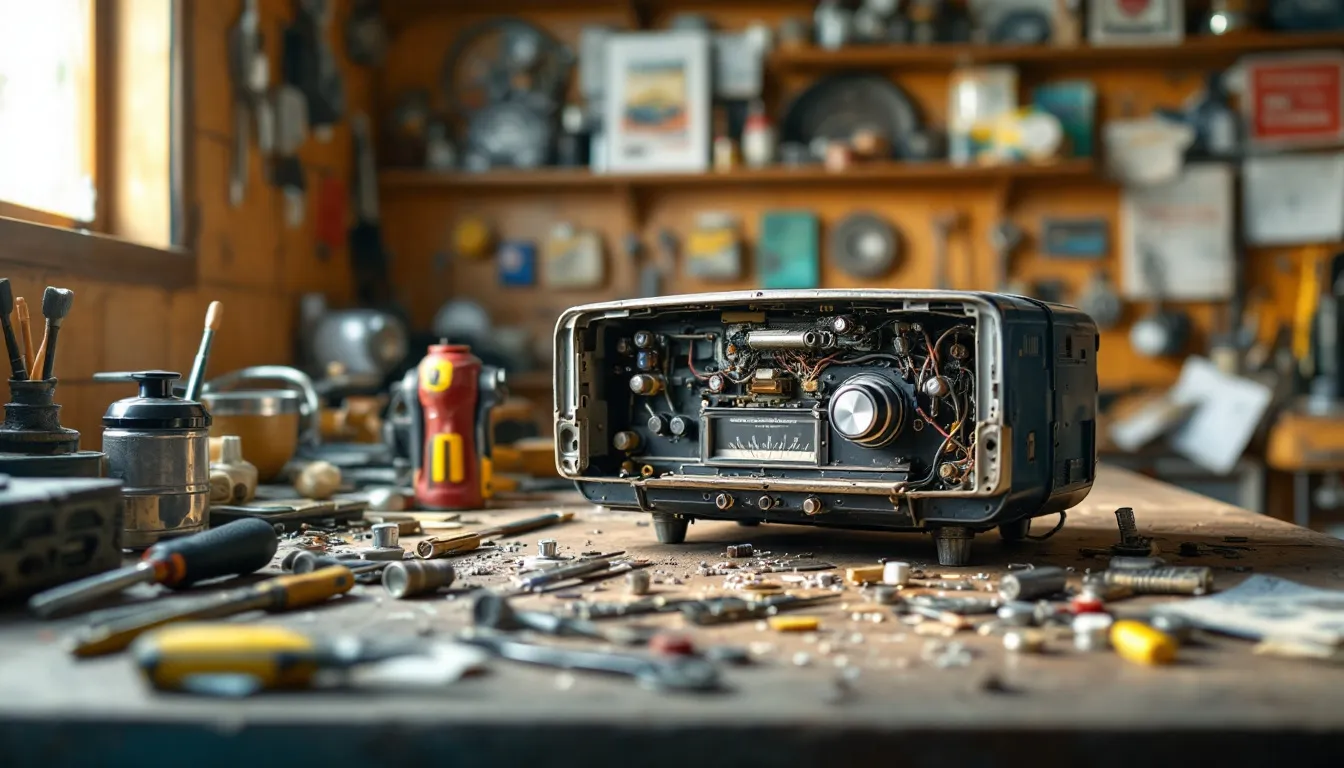
Classic Car Audio Customization
Classic and vintage vehicle audio restoration represents one of the most challenging and rewarding areas of custom audio work. These projects must balance historical authenticity with modern performance expectations, often requiring creative solutions to integrate contemporary technology into period-appropriate packaging.
Authentic Vintage Solutions
The most successful classic car audio installations maintain the visual authenticity that classic car enthusiasts value while providing the reliability and performance expected from modern systems. This requires deep understanding of original equipment aesthetics, mounting methods, and user interfaces from specific automotive eras.
Period-Correct Styling: Authentic restorations focus on maintaining the original appearance of classic car interiors from the 1940s through 1980s. This means sourcing or recreating appropriate knobs, bezels, and display elements that match the vehicle’s original design language.
Modern Digital Integration: Contemporary classic car audio systems cleverly hide modern capabilities behind traditional interfaces. Digital displays can be integrated into classic-style radios, providing modern functionality like Bluetooth connectivity, satellite radio, and smartphone integration without compromising the vintage aesthetic.
Slidebar Radio Functionality: Traditional slidebar radios with their characteristic horizontal tuning controls can be modified to include functional selectors and hidden digital controls. These modifications maintain the tactile experience classic car owners expect while enabling access to modern audio sources.
Component Considerations
Classic vehicle audio installations face unique challenges that require specialized solutions:
Power and Electrical Systems: Vintage vehicles often have electrical systems that differ significantly from modern standards. Custom audio installations must account for these differences, sometimes requiring voltage regulation, noise filtering, or complete electrical system upgrades.
Space Constraints: Classic cars weren’t designed to accommodate modern audio equipment. Custom solutions often involve creative mounting solutions, component miniaturization, or complete system redesign to fit within original equipment locations.
Environmental Durability: Classic vehicles may lack the environmental controls found in modern cars. Custom audio components must be built for durability in vintage vehicles, withstanding temperature extremes, vibration, and humidity that could damage standard equipment.
Restoration Services
Professional classic car audio restoration extends beyond simple installation to include comprehensive refurbishment of original equipment:
Original Equipment Refurbishment: Many classic car owners prefer to restore original radios and amplifiers when possible. This process involves rebuilding internal components, updating capacitors and other wear items, and sometimes adding modern capabilities while maintaining original functionality.
Reproduction Components: When original equipment cannot be restored, high-quality reproductions offer an alternative that maintains authenticity. These reproductions often incorporate modern reliability improvements while maintaining original appearance and mounting specifications.
Professional Audio Production Services
Custom audio production services cater to businesses, content creators, and organizations requiring original audio content tailored to specific brand identities, communication goals, or technical specifications. These services combine creative expertise with technical precision to deliver audio that serves specific purposes.
Brand Identity and Marketing Audio
Professional audio production for brand identity goes far beyond simple jingle creation. Modern brand audio encompasses comprehensive sonic identities that work across multiple platforms and applications:
Sonic Branding Elements: Custom audio content creation for brand identity includes developing consistent audio signatures that customers associate with specific companies or products. These elements must work effectively across various applications, from video advertisements to phone hold music.
Voice-Over Specialization: Professional voice-over recording requires careful attention to acoustic environments, microphone selection, and post-production processing. Custom solutions consider the specific delivery platform, target audience, and brand personality to achieve optimal results.
Adaptive Content Creation: Modern brand audio often needs to work across multiple platforms with different technical requirements. Custom production services create content that adapts effectively from high-end surround sound systems to smartphone speakers.
Technical Production Capabilities
Professional custom audio production requires sophisticated technical capabilities and equipment:
Advanced Recording Environments: Custom audio production facilities are designed and built for specific types of content creation. This includes acoustic treatment optimized for particular applications, specialized monitoring systems, and equipment selections that support the intended creative process.
Post-Production Specialization: Professional audio post-production services including mixing and mastering are tailored to client specifications and delivery requirements. This process considers factors like target playback systems, distribution platforms, and accessibility requirements.
Local Service Advantages: Many custom audio production services operate in specific geographic areas, offering personalized service and the ability to work closely with local clients. For example, production studios in cities like Independence, MO, can provide face-to-face consultation and rapid turnaround for regional clients.
Corporate and Commercial Applications
Business audio requirements often differ significantly from entertainment or artistic applications:
Presentation and Communication Audio: Corporate audio solutions for presentations and communications must prioritize clarity, professionalism, and technical reliability. Custom solutions consider factors like room acoustics, audience size, and integration with video or presentation technology.
Training and Educational Content: Audio for training and educational applications requires careful attention to comprehension, engagement, and accessibility. Custom production services can optimize content for specific learning environments and target audiences.
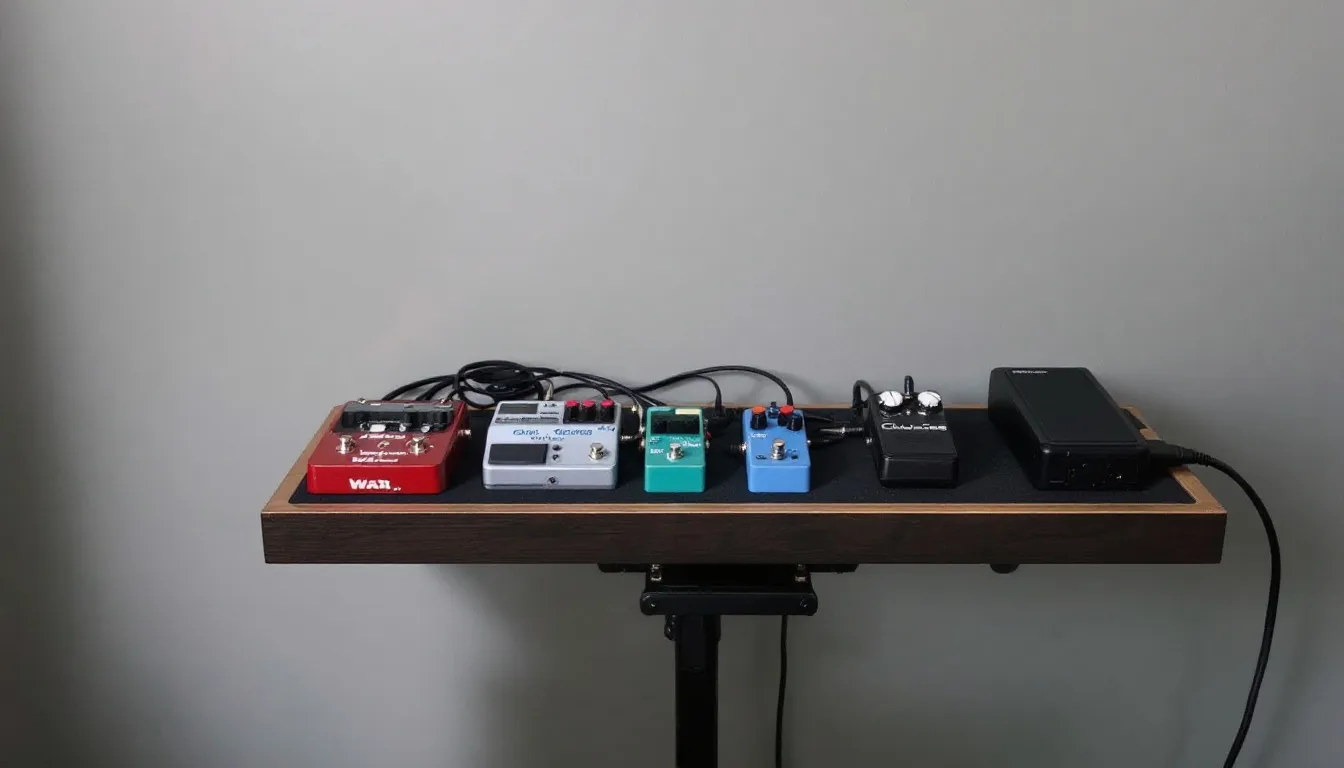
Music Equipment Customization
Musicians and audio professionals often require equipment modifications and custom builds that address specific creative needs, performance requirements, or technical limitations not met by standard commercial products. This sector combines technical expertise with deep understanding of musical applications and performer needs.
Guitar Rig Customization
Custom guitar systems represent one of the most active areas of music equipment customization, addressing the specific needs of different playing styles, genres, and performance situations:
Custom Pedalboard Design: Professional pedalboards are designed for specific guitar sounds and playing styles, considering factors like signal routing, power requirements, and physical ergonomics. Custom pedalboard builders work closely with musicians to understand their creative process and performance requirements.
MIDI Integration: Advanced guitar control systems like the CAE RS-T MIDI foot controller enable sophisticated switching and parameter control for complex rigs. These systems are often customized for specific musicians’ setups and performance requirements.
Amplifier Rack Systems: Custom amplifier racks built for touring musicians require careful attention to transportation, setup efficiency, and reliability. Many of these systems have been refined since the 1990s, incorporating lessons learned from extensive touring use.
Professional Setup Integration
Custom music equipment often needs to integrate with existing professional setups and educational resources:
Touring System Design: Professional touring rigs require custom solutions that address transportation, setup time, and reliability concerns. These systems often incorporate backup capabilities and modular design that enables quick troubleshooting and component replacement.
Studio Integration: Custom music equipment for studio applications focuses on sonic quality, flexibility, and integration with recording systems. These installations often include custom monitoring, routing, and control systems designed for specific recording environments.
Educational Applications: Music educational institutions often require custom equipment solutions that serve both instructional and performance needs. These systems must be durable, flexible, and designed for use by multiple users with varying skill levels.
Modification and Repair Services
Beyond building new equipment, many custom music equipment services specialize in modifying and improving existing instruments and equipment:
Performance Upgrades: Existing equipment can often be modified to improve performance, add capabilities, or address specific user needs. These modifications require deep understanding of the original equipment design and the target improvements.
Reliability Improvements: Touring and professional use often reveals reliability issues with standard equipment. Custom modification services can address these issues, improving long-term reliability and reducing maintenance requirements.
Customization for Accessibility: Musicians with physical limitations may require equipment modifications to enable comfortable and effective use. Custom solutions can address ergonomic requirements while maintaining full functionality.
Custom Cable Solutions
While often overlooked, cables and connectivity represent critical components of any audio system. Custom cable solutions address specific technical requirements, physical constraints, and quality standards that standard cables cannot meet.
Hand-Built Cable Advantages
Custom cables offer several advantages over mass-produced alternatives, particularly in professional applications:
Optimized Design: Hand-built audio and video cables can be designed with specific applications in mind, optimizing conductor selection, shielding design, and connector choices for particular use cases. This optimization can significantly impact signal quality and system reliability.
Quality Control: Custom cable builders typically use higher-quality components and more rigorous assembly processes than mass-production facilities. This results in cables with better long-term reliability and consistent performance.
Exact Length Specifications: Custom cables can be built to exact lengths, eliminating excess cable that can cause signal degradation and installation complications. This is particularly important in professional installations where precise routing is critical.
Professional Applications
Custom cable solutions serve a wide range of professional applications:
Simple to Complex Solutions: The range of custom cable projects extends from simple patch cables to complex multi-channel stage snakes that route dozens of signals over significant distances. Each application requires specific design considerations and quality standards.
Specialized Services: Professional cable services include specialized capabilities like soldering, crimping, and re-wiring that enable repair and modification of existing installations. These services often prove more cost-effective than complete replacement.
Microphone and Headset Services: Custom modification and repair services for microphones and headsets address specific user requirements or repair needs that cannot be met through standard service channels.
Ordering and Delivery Systems
Modern custom cable services have developed efficient systems for managing custom orders and delivery:
Online Configuration Tools: Many custom cable providers offer online ordering systems that enable faster custom cable configuration by allowing customers to specify exact requirements through standardized interfaces.
Global Delivery Capabilities: Professional custom cable services often provide worldwide shipping options, enabling access to specialized finishing options and quality standards regardless of customer location.
Rush and Standard Timelines: Custom cable providers typically offer both standard and expedited delivery options, allowing customers to balance cost and timeline requirements based on project needs.
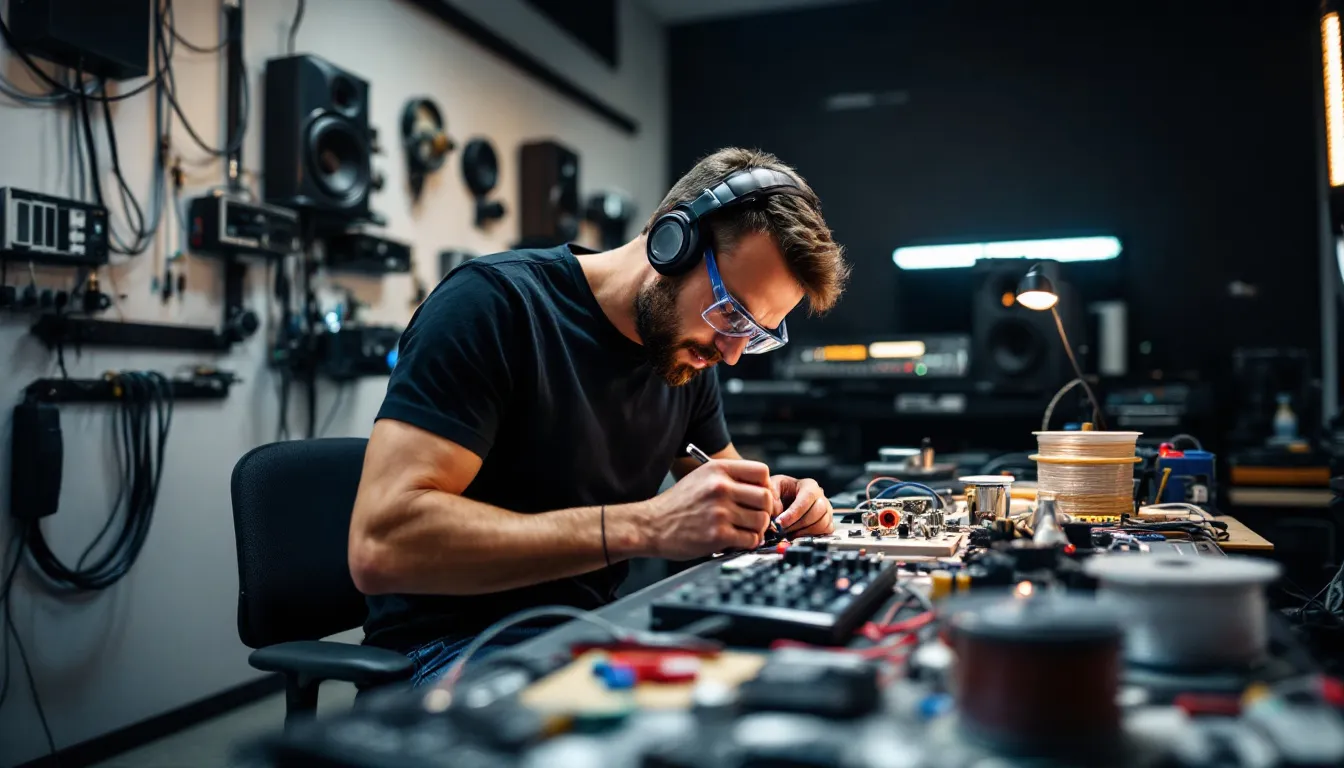
Choosing the Right Custom Audio Provider
Selecting the appropriate custom audio service provider requires careful evaluation of multiple factors, from technical capabilities to communication style. The right choice can mean the difference between a successful project that exceeds expectations and a frustrating experience that fails to deliver desired results.
Key Evaluation Factors
Several critical factors should guide the selection process for custom audio providers:
Experience and Specialization: The provider’s experience in your specific application area often matters more than general audio experience. A provider specializing in classic car audio may not be the best choice for professional studio installation, even if both involve custom audio work.
Geographic Considerations: While many custom audio services can work remotely, proximity often provides advantages in terms of consultation, installation support, and ongoing service. Local providers can offer face-to-face meetings and easier access for system modifications or repairs.
Portfolio and References: Reviewing previous work and speaking with past customers provides insight into the provider’s capabilities, communication style, and problem-solving approach. Look for projects similar to yours in scope and complexity.
Technical Capabilities: Ensure the provider has the technical capabilities required for your specific project. This includes equipment, expertise, and access to specialized components or services that your project may require.
Essential Questions for Providers
When evaluating potential custom audio providers, asking the right questions can reveal important information about their capabilities and approach:
Project Experience: “Can you provide examples of similar projects you’ve completed?” This question helps assess relevant experience and gives insight into the provider’s problem-solving approach.
Timeline and Process: “What does your typical project timeline look like, and how do you handle unexpected complications?” Understanding the provider’s process helps set realistic expectations and reveals their approach to project management.
Support and Warranty: “What kind of ongoing support do you provide, and what warranty options are available?” Custom audio systems often require ongoing adjustments and occasional repairs, making long-term support important.
Cost Structure: “How do you handle cost estimates, and what factors might affect final pricing?” Understanding the provider’s pricing approach helps avoid surprises and enables better budget planning.
Research and Comparison Process
Effective provider selection requires systematic research and comparison:
Store Locators and Online Tools: Many custom audio providers offer store locators and online tools to help potential customers find local specialists. These tools can provide initial screening based on location and service specialization.
Pricing and Timeline Analysis: Comparing pricing and turnaround times for custom projects requires careful attention to project scope and specifications. Ensure comparisons are based on equivalent project requirements and quality standards.
Review Analysis: Reading reviews and testimonials provides insight into customer satisfaction and potential issues. Look for patterns in feedback and pay attention to how providers respond to criticism or problems.
Portfolio Evaluation: Examining portfolios of previous work helps assess quality standards, attention to detail, and aesthetic sensibilities. Look for projects that demonstrate capabilities relevant to your specific needs.
Decision Framework
Making the final provider selection should consider both objective and subjective factors:
Technical Fit: Does the provider have the specific technical capabilities and experience required for your project? This includes both equipment and expertise requirements.
Communication Style: Do you feel comfortable with the provider’s communication style and approach? Custom audio projects often require extensive collaboration, making good communication essential.
Value Proposition: Does the provider offer good value considering their pricing, capabilities, and service level? Remember that the lowest price may not represent the best value if it comes with compromises in quality or service.
Long-Term Considerations: Will the provider be available for ongoing support, modifications, and potential future projects? Building a relationship with a trusted provider can provide long-term benefits beyond the initial project.
Understanding warranty and support options for custom audio solutions ensures protection of your investment and provides peace of mind. Custom audio systems often represent significant investments and may require ongoing adjustments or occasional repairs.
The custom audio industry continues evolving, driven by advances in digital technology, changing consumer expectations, and new applications in areas like virtual reality and adaptive media. Whether you’re seeking to restore a classic vehicle’s authentic character, create a professional studio environment, or develop a unique brand identity, custom audio solutions offer possibilities that standard products simply cannot match.
Success with custom audio projects depends largely on choosing the right provider and clearly communicating your specific requirements and expectations. Take time to research options, ask detailed questions, and find a provider whose expertise aligns with your particular needs. The investment in finding the right custom audio solution will pay dividends in performance, satisfaction, and long-term value.
The world of custom audio offers endless possibilities for those willing to explore beyond standard solutions. From hand-built cables that ensure perfect signal transmission to complete custom installations that transform spaces, these specialized services enable audio experiences that truly match your vision and requirements.




